An interview with Scott McLeod from StrydAR: The Future of Parkinson’s Mobility is Here: StrydAR Glasses Reinvents the Concept of Mobility Aids on December 31, 2023 by George Ackerman, Ph.D, J.D. (Cover photo Depicted Scott is trying on the glasses)

Biography:
For thirty years, I’ve been immersed in the world of technology and entrepreneurship. In 2019, I was building a new concept AR App for a global drinks company, aiming to foster a sense of community. Then, one defining day, everything shifted. My good friend David, a dedicated Neurophysiotherapist, showed me a video of a man with Parkinson’s struggling with a stooped posture and a shuffling gait. But as he stepped onto sheets of paper, his mobility issues, seemingly by magic, vanished. Though skeptical at first, David explained that this phenomenon is called Visual Cueing, a technique frequently used in clinics worldwide. The question then became: Could we make a mobile version of this? I felt an unstoppable wave of conviction and responsibility. In that moment, I realized my life’s mission: to leverage my 30 years of experience and skills, not to enrich corporations, but to empower individuals with Parkinson’s to reclaim their mobility and independence.
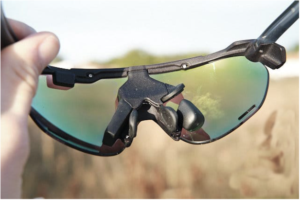
Can you tell me more about your organization?
At Strydar, our dedication lies in improving the lives of individuals with neurological movement disorders, such as Parkinson’s disease. Our mission extends beyond technology; we aim to make a meaningful impact on the global Parkinson’s community by reimagining what a modern mobility aid looks like.
Five years ago, we embarked on a journey to bring our vision to life—creating a Visual Cueing Headset. Through extensive trial and error, constant innovation, and new discoveries along the way, we successfully developed the world’s first commercial pair of AR Visual Cueing smart glasses. Meticulously designed and practically invisible as a mobility aid, our glasses enhance posture, balance, and gait
What is your passion, and how did you get involved in Parkinson’s awareness and hope for a cure?
Our passion lies in leveraging technology to improve the daily lives of those affected by Parkinson’s. The journey began in 2019 with a personal revelation of the potential impact of digital visual cues. Since then, we’ve been committed to raising awareness and fostering hope for a brighter future through our groundbreaking solutions.
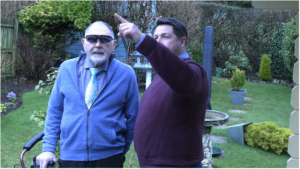
What type of goals do individuals with Parkinson’s have when working with you?
No two people we speak with have the same story; everyone’s Parkinson’s is unique to them. However, they all share similar goals depending on where they are in their Parkinson’s journey:
Improve their mobility
Improve their confidence
Improve their independence
Participate in social events
Most people I speak with experience a sense of lost hope because Parkinson’s keeps taking something from them. Then, when they have a positive interaction with our glasses, for the first time in a long while they feel they are able to fight back against their Parkinson’s, which fills them with hope.
Witnessing hope rekindle after years of loss is profoundly rewarding.
Let me share a short story about Eddie: Eddie took part in our Pilot Study in 2021 he is in his 80s and has had Parkinson’s for 25 years, Eddie used a walking frame for 4 years due to balance and freezing issues. Eddie had an immediate improvement in Posture, Balance and Gait the instant he wore our glasses, so much so he asked if he could hold on to them for another month. It turned out Eddie wanted to wear the glasses at his granddaughter’s wedding instead if using his walking frame. On the day of the wedding, to everyone’s amazement, especially his granddaughter, Eddie walked down the aisle of the church like a soldier marching on parade with a twinkle in his eye and a feeling of pure joy. Eddie tearfully told me “at the reception I was able to fulfil my dream of dancing with my granddaughter on her Wedding day.” A beautiful and touching memory they both can cherish of this special occasion.

What type of programs do you have the glasses available for?
We offer a subscription program that includes a pair of Strydar glasses and access to coaching as needed. Because everyone’s Parkinson’s is unique to them, our coaching is highly personalized to cater to individual needs. As you would expect, the coaching is very hands-on in the first month and then starts to taper off. However, we do like to check in with every one of our subscribers once per month.
What effect can it have on an individual with Parkinson’s?
The use of Strydar Glasses has shown remarkable effects, significantly improving posture, balance, gait, and overall walking movement, for many users. Users often experience enhanced mobility, increased confidence, and a positive impact on their daily lives. Some even express reduced muscle and back pain and improved sleep patterns. One subscriber even told us that wearing her glasses while on a cruise actually cured her seasickness!
What would you like to see as a future goal for your programs?
Our future goal is to expand the reach of our programs globally. Making the benefits of Strydar Glasses accessible to a larger population. We aspire to continually innovate and contribute to advancing solutions for Parkinson’s care.
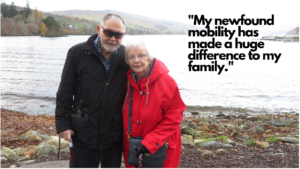
What events do you participate in?
As a startup, we are constantly juggling the costs of attending trade events, which can be extremely expensive in this space. We attended the World Parkinson’s Congress in Barcelona, which was amazing, and we met so many incredible people. Next year, we intend to attend Parkinson’s meet-up groups, doing a show-and-tell to raise awareness and allow people to try our glasses.
How does this also assist the caregivers?
Strydar Glasses not only benefit individuals with Parkinson’s but also provide support and relief to caregivers and families. By enhancing the independence, confidence, and well-being of those affected, caregivers and families can experience a positive impact on their caregiving responsibilities.
How can someone get in touch? What is your website?
To get in touch with us, individuals can visit our website at www.strydar.com or contact me directly at scott@strydar.com.
Mobile & Whatsapp: +44 7890 025 721
If someone does reach out to us, please provide some background information about your interest, whether it’s for yourself or a family member, and some details about your Parkinson’s and how it affects you.
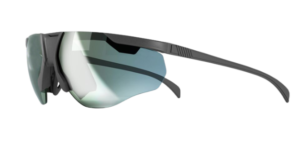
How can others also become advocates for awareness?
Becoming an advocate for Parkinson’s awareness involves spreading knowledge, participating in relevant events, and sharing inspiring stories. Individuals can engage with local and global Parkinson’s communities, support organizations, and use social media platforms to amplify awareness.
We also experience a high number of our subscribers wishing to raise awareness for StrydAR glasses, and as a small startup, we are grateful for every piece of awareness we can get.
In your opinion, what is the key to effective advocacy?
The key to effective advocacy lies in fostering empathy, understanding, and collaboration. By sharing stories, raising awareness, and collaborating with diverse stakeholders, we can collectively drive positive change.
How can we better fundraise to support a cure for Parkinson’s?
Effective fundraising involves creating engaging campaigns, leveraging social media, collaborating with influencers, and establishing partnerships with organizations aligned with the cause. Communicating the impact of donations on research and innovation can also motivate supporters.
What other activities do you undertake to help improve and support your daily living, e.g., exercise and alternative remedies?
During our coaching programs, we encourage individuals to explore holistic approaches to improve daily living. This may include regular exercise, nutrition, and exploring complementary therapies to enhance overall well-being.
Why should people who don’t have Parkinson’s care about this?
The impact of Parkinson’s extends beyond those directly affected; it touches families, communities, and societies. By supporting innovations like Strydar Glasses, individuals without Parkinson’s contributed to creating a more inclusive and compassionate world. As the global population of those over 60 is set to double over the next 30 years, Parkinson’s will start to have an impact on everyone’s lives.
Have you had any family members or relatives affected by Parkinson’s disease?
Prior to starting Strydar I did not know anyone who had Parkinson’s. Since building Strydar I now have dozens of friends who have Parkinson’s
If you had one song that would tell us more about you or represent your life, which song would it be?
If I had to pick one, it would be Neil Diamond’s ‘Hello’ from the Jazz Singer. This was my dad’s favorite film, and I must have watched it over 60 times with him. My Dad was my hero, and he passed away in 2016 from cancer at 72. I make a point of watching it every December, and it always brings a tear to my eye—in a good way. I feel that he is there watching it with me.
If you had one final statement or quote you could leave for the Parkinson’s community, what would it be?
In the face of Parkinson’s challenges, let us embrace resilience, unite in hope, and stride forward together. Together, we redefine what’s possible and light up the path towards a future of strength, support, and endless possibilities.
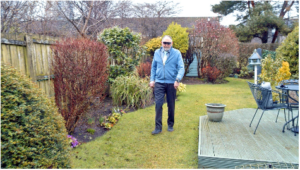
The Technology:
Strydar – Parkinson’s Walking Glasses
Winner of the 2022 Scottish Edge Awards
The Problem:
Our glasses are designed to assist people with Neurological Movement Disorders, such as Parkinson’s Disease. Our aim is to make daily life a little easier for those who struggle with their mobility.
Neurological disorders are now the leading cause of disability worldwide, and the fastest-growing neurological disorder is Parkinson’s Disease.
Currently, there are over 10 million people living with Parkinson’s globally, and that number is expected to grow. Some experts believe that one in 37 people will be diagnosed with Parkinson’s in their lifetime.
Medication is used to alleviate the symptoms of Parkinson’s, but there is currently no cure for this debilitating disease. Symptoms such as shuffling gait, stooped posture, poor balance, freezing, and insomnia are just some of the challenges associated with Parkinson’s. Our glasses have been shown to improve all of these symptoms.
The Solution:
Visual Cueing is a technique used in physiotherapy clinics worldwide for decades. It involves marking a pathway on the floor in front of the patient using markers, such as lines of tape or pieces of paper. When many patients walk over these markers, they experience an instant improvement in stride length and speed.
What’s happening here is that Flexible Motor Control is governed by the Basal Ganglia, which is fueled by Dopamine. People with Parkinson’s lose the ability to produce Dopamine, which is the root cause of their mobility issues.
Neurologists believe that Visual Cueing works by bypassing the impaired Basal Ganglia, sending a signal directly to the Motor Cortex, leading to an instant improvement in mobility.
Our Device:
StrydAR’s Parkinson’s Walking Glasses redefine the concept of a mobility aid. These glasses have been developed as a Visual Cueing Mobility Device to assist those living with Parkinson’s.
Our glasses project a hologram into the wearer’s upper peripheral vision, bypassing the part of the brain impaired by Parkinson’s and sending a signal directly to the Motor Cortex. Our Patent-Pending hologram can instantly improve posture, balance, and the quality of walking for many individuals.
Many people with Parkinson’s are very self-conscious about their condition, which often leads to social isolation. This not only accelerates the progression of the disease but also places additional responsibilities and pressure on their family members.
Remaining inconspicuous is a significant benefit, especially for the Parkinson’s community. Therefore, we’ve designed our glasses to be as discreet as possible, making them virtually indistinguishable from a pair of regular sunglasses. This allows the wearer to move around without drawing attention to their disability.
Our glasses will be the first device on the market to offer a versatile and effective way to provide visual cues, both indoors and outdoors. This empowers people to live more independently and meaningfully, reducing the risk of falling and greatly improving independence, quality of life, physical activity, social interaction, mental health, mood, and cognitive function.
Independent Validation:
We conducted an academic pilot study in collaboration with Robert Gordon University of Aberdeen. Senior Lecturer Julie Jones had this to say: “A pilot study was carried out by RGU University, involving people with Parkinson’s. Participants’ walking was assessed with and without the glasses and then reassessed two weeks later. 70% of participants reported perceived improvements, including enhanced stability, confidence, balance, and reduced cognitive load associated with walking.”
More recently, an independent in-clinic study was conducted by Neurological Physiotherapist Jude Simms. Twenty participants were assessed at the start of the trial and then provided with a pair of glasses to take home for three weeks. Participants were instructed to wear them for two 20-minute periods per day while mobile. After three weeks, all 20 participants showed significant improvements in all four categories they were tested on.
Take a look at some of our videos
Video’s
STV News Report
Eddie’s Interview
https://youtu.be/DSxGgwJo-0o
Eddie’s Avatar Video
Our Journey
Eddie Video – Short
Davie – video
Norman
https://youtu.be/wL2h6T2G3QA
This video inspired us to start working on PD Glasses

